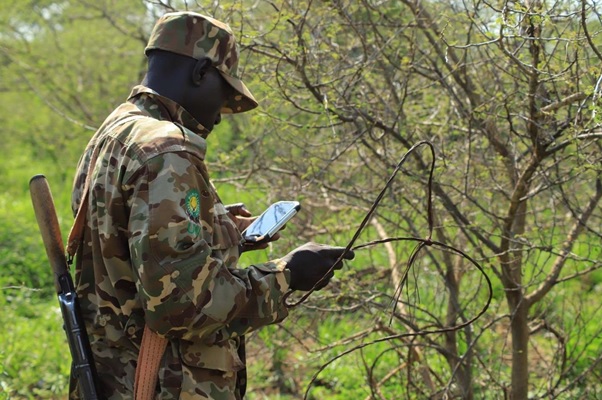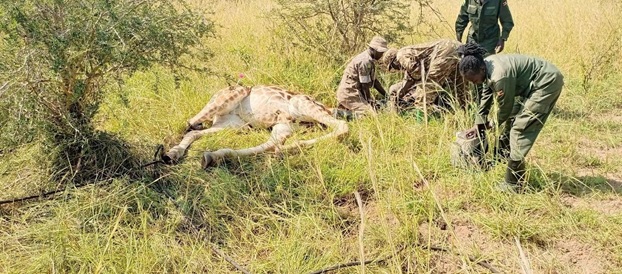
A ranger holding a snare and recording its location in the park. Photo Credit: Isaac Kiira/WCS
On November 23, 2021, Isaac Kiirya, the Illegal Wildlife Trade (IWT)/Combatting Wildlife Trafficking (CWT) Manager at WCS joined the Uganda Wildlife Authority (UWA) law enforcement team for a 10-day de-snaring mission in Murchison Falls National Park, where they encountered a giraffe that was struggling to free its front left leg from a wire snare. They immediately had to launch a rescue to detangle it and save its life in time.
“When we saw the giraffe, we immediately contacted the Veterinary Unit of the UWA at the Park. When they eventually located us by following the GPS coordinates we had availed them, Dr. Margaret Driciru, the UWA Veterinary Doctor tranquilized the giraffe for easy management. Using a pair of pliers, cut the wire snare off the leg. The wire snare had constricted blood flow and caused leg swelling as the Giraffe struggled to get off the wire snare. To prevent infection and faster healing of the affected leg, Margaret administered the injectable antibiotic to the victim giraffe and later reversed it after treatment. With the team standing out of its kicking range, the giraffe stumbled a little bit from the medication, and gracefully walked off into the savanna grasslands of the park to re-join the family members who were grazing in a distance of about 200 meters”, narrates Isaac.

The vet Team administering the antibiotics and reversal does. Phot credit: Isaac Kiirya/WCS
Murchison Falls National Park hosts approximately 50% of Africa’s Nubian Giraffe. The park boasts of an estimated 1,495 individuals, making the conservation of the Giraffe critical. Luckily, this Nubian Giraffe that has been recognized by International Union for Conservation of Nature (IUCN) as a critically endangered species, survived the wire snare ordeal. Poachers mainly target Uganda Kobs, Buffaloes, Hartebeests, Bushbucks, Waterbucks and most recently the Giraffe for bush meat. Unfortunately, these wire snares also physically injure and indiscriminately kill other threatened species in Uganda, including elephants and lions. Poachers strategically set wire snares along game trails, salt licks and near watering points to trap animals. “The poachers suspend the loops of the wire snares from a tree stem, branch, small tree, or at the base of a small tree to trap animals by the neck, leg, or torso. They eventually kill the animals using spears and pangas (bladed African tools like machetes),” says Isaac.
WCS is working in collaboration with UWA with support from UKAID to conduct de-snaring missions to protect wild animals from snares. The activity is undertaken by a team of 12 Rangers. They walk for six hours on foot daily, recording incidences of poaching, dead carcasses, collecting wire snares and wheel traps. The team uses a Spatial Monitoring and Reporting Tool (SMART) installed on their android phones. These phones are also loaded with a cyber-tracker that enables protected-area Managers to track exact routes, generate real-time reports to assess the performance of patrol teams, detect areas of high snare concentration and guide deployment of Rangers.

Isaac (blue shirt) with rangers conducting a foot patrol to remove snares in the park. Photo credit: Clinton Tumwebaze
Since 2019, WCS has contributed to the removal of 1,746 snares, three wheel traps and rescued several animals, including Giraffes, Uganda Kobs and Hartebeests from these snares. WCS has also sensitized 1,148 community members living adjacent to the national parks about wildlife offenses and penalties to minimize incidences of poaching, illegal trade, and trafficking.
According to Dr. Simon Nampindo, WCS Uganda Program Country Director, "Whereas we seem to be making headway in combating illegal activities inside protected areas, the critical step is to prevent the wildlife crime from happening. It is way too costly to handle crime than it is to prevent it. We need to focus our investments in robust intelligence gathering, investigative capacity and build a strong community network of informants so that we can stop these illegal activities before they happen,” adds Simon. WCS is committed to support UWA to efficiently and effectively combat wildlife crime in protected areas using SMART to improve law enforcement and save wildlife.